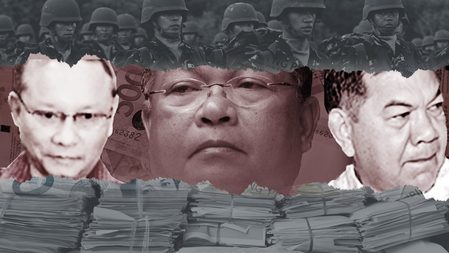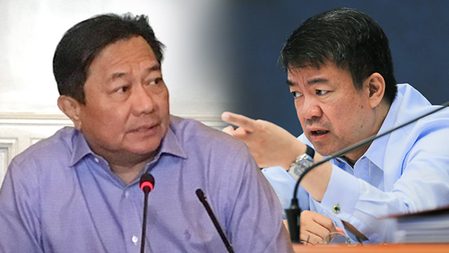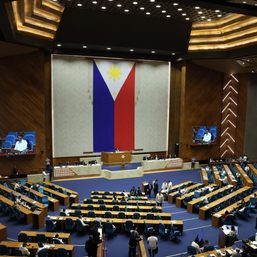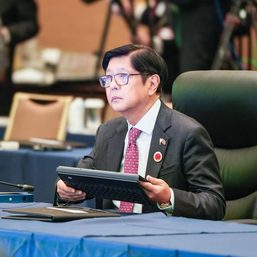SUMMARY
This is AI generated summarization, which may have errors. For context, always refer to the full article.

MANILA, PHILIPPINES – From 21 agencies in 2016, the number of agencies and departments that have confidential funds in their budget has grown to 28 under the 2024 budget.
The latest department to hop on the confidential funds bandwagon for 2024 is the Department of Agriculture (DA).
The DA, which up to this point is still headed by President Ferdinand “Bongbong” Marcos Jr., wants P50 million in confidential funds for 2024. This amount is on top of the P2.31 billion in intel funds and P2.25 billion in confidential funds that Marcos will have access to under the Office of the President.
Confidential funds are supposed to be used for “surveillance activities in civilian government agencies that are intended to support the mandate or operations of the said agency.”
From P728.97 million in 2016, confidential funds in the national budget more than doubled in 2017 – the first budget formulated by the Duterte administration – to roughly P2.08 billion. In the 2020 budget, which was enacted just before the COVID-19 pandemic started, Congress okayed the Duterte administration’s request to double the sum further to 4.57 billion.
The allocation for confidential funds did decrease to P3.94 billion by 2022. But in its first budget proposal to Congress, the Marcos administration asked for an increase of almost 1 billion, bringing the numbers to P4.8 billion in the 2023 budget.
The year 2000 marks the one other time that the DA had an item for confidential funds in its budget. This was during the Duterte administration with then-agriculture secretary William Dar at the helm. It did not make this request in succeeding years, until now.
Department of Education
The other newbie in the club of agencies favored to have confidential funds is the Department of Education (DepEd). Until 2022, the agency never had this type of funds in its budget proposals.
It was allowed to receive P150 million in confidential funds for the first time in its 2023 budget. If Congress approves its new budget request, it will receive the same amount in 2024.
DepEd is currently headed by Vice President Sara Duterte, who will have access to another P500 in confidential funds via the Office of the Vice President.
Sara Duterte’s predecessor, Leni Robredo, did not have access to confidential funds. In the 2022 GAA, the OVP had no allotments for confidential funds.
Yet, later budget documents and audit reports show that Duterte spent P125 million in confidential funds in 2022, the first year she assumed office.
Funds for spying, surveillance
Since 2012, confidential funds have been made distinct from intelligence funds. Intelligence expenses, according to the General Provisions of the 2023 budget, refer to “intelligence information gathering activities of uniformed and military personnel, and intelligence practitioners that have direct impact [on] national security.”
According to the same law, these intel funds may only be released or disbursed upon approval by the president of the Philippines.
Confidential funds, on the other hand, only require approval of the department secretary concerned. The law also does not directly link release of these funds to national security concerns. According to the 2023 budget, confidential expenses are used for surveillance activities in civilian government agencies that are “intended to support the mandate or operations of the agency.”
Unlike the agencies that were given confidential funds, those that have received intel funds have pretty much been the same since 2014: the Office of the President, the Philippine National Police (PNP), the Defense Department and the military establishment, the National Intelligence Coordinating Agency (NICA), and the Philippine Coast Guard.
Prior to this, the Office of the Ombudsman had its own intelligence funds for 2012 and 2013. Since 2014, however, these funds have been reclassified to confidential funds.
Prior to 2012, amounts for surveillance and intelligence-gathering activities were reflected in the budgets as combined confidential and intel funds.
Alarming growth, misplaced priorities
In terms of total amounts, confidential funds have increased significantly. The Marcos administration is now asking for P4.86 million in the proposed 2024 budget, reflecting an even higher amount compared to this year. This is on top of intelligence funds it is requesting for, amounting to roughly 5.28 million.
Funds for intelligence gathering by military and uniformed personnel also grew significantly during the Duterte years.
From P852.62 million in 2016, total intelligence funds jumped to P3.49 billion in 2017, with the Office of the President, the PNP, and the defense and military establishment getting the bulk of the increases.
Intel funds reached a peak in the 2018 budget, where total allocation for this type of fund hit a total of P5.6 billion.
But while some civilian agencies are enjoying huge bumps in confidential fund allotments, some agencies directly involved in challenges relating to national security are not getting that much funding.
Even among the uniformed services, land-based forces were given more intelligence fund allocations than units involved in territorial defense.
For instance, a vessel of the Philippine Coast Guard, whose mission to deliver food and provisions for soldiers defending Ayungin Shoal, was recently thwarted by the Chinese Coast Guard using water cannons. Its budget for intelligence? Only P10 million.
In an interview on ANC’s Headstart, Commodore Jay Tarriela, spokesperson for West Philippine Sea of the Philippine Coast Guard, said this has been the case for the past 15 years.
“Probably with what is happening now in the West Philippine Sea, with the magnitude of the function of the Coast Guard, not to mention the maritime safety and maritime environment protection, it is important for the Coast Guard to receive a larger intelligence fund to support our operations.”
The intelligence fund of the Philippine Navy, another unit involved in the territorial dispute, has also remained stagnant at P39.75 million since 2019.
In contrast, the Philippine Army, which has been battling the communist insurgency for decades, has over P440 million in intelligence funds at its disposal. This is despite the fact that the AFP itself has reported that the number of rebels is now down to 1,800 as of 2023.
The Army’s intelligence funds jumped from P64 million in 2016 to its current level beginning in 2017. This period also saw a rise in red-tagging of activists and journalists on social media. Later investigations revealed that military officers working for the Army’s Civil Military Operations regiment were behind social media pages involved in these red-tagging operations.
Limitations on use of funds, auditing challenges
The use of confidential and intelligence funds is currently governed by a joint circular signed by the Department of Budget and Management and the Commission on Audit in 2015.
The circular limits use of intelligence funds to the following:
- Counter-intelligence activities that have direct impact on national security
- Special projects and operations, as approved by the head agency, involving covert or semi-covert psychological, internal security operation and peace and order activities as well as programs and campaigns against lawlessness and lawless elements involving intel activities
On the other hand, the circular specifies that confidential funds may be used only for:
- Purchase of information necessary for the formulation and implementation of program, activities and projects relevant to the national security and peace and order;
- Rental of transport vehicle related to confidential activities;
- Rentals and the incidental expenses related to the maintenance of safehouses;
- Purchase or rental of supplies, materials and equipment for confidential operations that cannot be done through regular procedures without compromising the information gathering activity concerned;
- Payment of rewards to informers (non-employee of concerned government agency)
- Uncovering or preventing illegal activities that pose a clear and present danger to agency personnel/property, or other facilities and resources under the agency protection, done in coordination with the appropriate law enforcement agencies;
- Other purposes that may be authorized by the GAA or other special laws
The circular also stipulates that these funds are supposed to be audited by the Intelligence and Confidential Fund Audit Unit (ICFAU), a unit created under the Office of the Chairperson of the COA tasked with the audit of confidential and intelligence funds.
In reality, unlike other budgetary items which are subject to liquidation and documentation, confidential and intelligence funds do not go through the same auditing rigor, various COA chairpersons have admitted in separate interviews.
By their very nature and their impact on national security, the specific uses of these funds are not disclosed to the public, said former COA chairperson Grace Pulido Tan in a previous interview.
Auditors have to rely on certifications by government agencies using their confidential and intel funds, since receipts are not always expected for many expenses charged against these funds.
Auditors and budget insiders say the only way to really account for these funds is by making those utilizing them accountable for intelligence operation outcomes.
Agencies utilizing intelligence funds are supposed to submit to the president of the Philippines a quarterly report on the accomplishments related to the use of the said funds. Similarly, agencies with confidential funds are supposed to submit both to the president and both houses of Congress a similar quarterly report.
Whether this happens is not really clear. In budget hearings, lawmakers rarely ask agencies to report on how the use of such funds improved their operations.
Congress itself is not immune to the thirst for confidential funds. In 2020, the Senate budget reflected confidential funds amounting to P100 million. This same amount was reflected again in the 2021 budget but was later reduced to P50 million in 2022.
To the Senate’s credit, this was reduced yet again to zero in succeeding years. But the lure of secret funds will be difficult to resist until stricter mechanisms or guidelines are put in place. – Rappler.com
Add a comment
How does this make you feel?

![[ANALYSIS] Legalizing plunder: Confidential and Intelligence Funds in the 2023 National Budget](https://www.rappler.com/tachyon/2023/04/TL-intelligence-funds-april-11-2023-1.jpg?fit=449%2C449)






![[OPINION] The Duterte legacy: Confidential funds](https://www.rappler.com/tachyon/2023/09/duterte-legacy-confidential-funds-september-21-2023.jpg?resize=257%2C257&crop_strategy=attention)
![[OPINION] Unpaid care work by women is a public concern](https://www.rappler.com/tachyon/2024/07/20240725-unpaid-care-work-public-concern.jpg?resize=257%2C257&crop_strategy=attention)




There are no comments yet. Add your comment to start the conversation.